Saints of the 13th Century
The great lovers of the Holy Eucharist in the 13th century were St. Thomas Aquinas and St. Bonaventure. They are known as the "Heralds of the Blessed Sacrament". There were also many other great lovers of the Blessed Sacrament in that century.
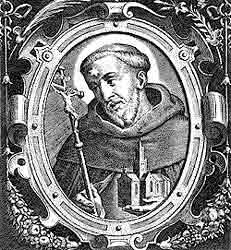 |
St. Dominic, the
founder of the Dominican Order who died in 1211, worked very hard to convert
the heretics, known as the Albigenses. They did not believe in the Mass
or the Blessed Sacrament. But St. Dominic had a great love for the Mass
and the Blessed Sacrament and depended on Jesus and Mary to help him convert
the heretics.
The great St. Francis
of
The heart and soul of St. Francis was on fire with love for the most Blessed Sacrament. He preached, “My people, it is your duty to give all you can, to buy beautiful chalices and beautiful vessels for the altar". From then on, people have made an effort to have chalices and other altar vessels, made of gold and silver, wherever it was possible.
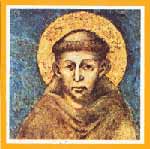 |
|
But greater than his love for the precious vessels, was his concern about the living tabernacles of men. He encouraged his Third Order Franciscans to receive Holy Communion often, and not just once a year. Although St. Francis was not a priest, he heard Mass every day and if he was sick he assisted at the Mass in a spiritual way. Every time he received the Blessed Sacrament he went into ecstasy.
He used to say, "We religious bear the weight of the great sin and ignorance that certain ones have in regard to the Most Sacred Body and Blood of the Lord Jesus Christ and to His Most Holy Name. If the Blessed Virgin Mary was honoured because she carried in her womb the very Son of God… If Blessed John the Baptist trembled and dared not touch the head of Christ… If the sepulcher which Jesus occupied is venerated; then it is just that he should be holy who touches with his hands, who receives with his lips and heart the immortal and glorious Body of Christ."
He would encourage
the people, "With humility and charity I beg you dear people to
use all the reverence and honour possible toward the most Blessed Sacrament
of the Altar, where Christ dwells in the midst of sinful men."
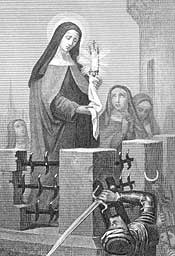 |
St. Clare, (1193-1253) the first woman to become a nun in the Franciscan Order, also had a very great devotion to the Most Blessed Sacrament. She received Holy Communion as often as she was permitted. One day after she had been to Communion, the Child Jesus came to visit her. He lay in her arms and covered her with kisses. This same miracle also took place at her death.
We often see pictures
of St. Clare holding a monstrance, which contains the Most Blessed Sacrament.
This was something that really happened in the life of St. Clare. The
Saracens of the army of Frederick II attacked
At that moment, Our
Lord spoke to her with the voice of a child, "I will keep you
always." Suddenly, Our Lord worked a miracle, and the Saracens
were turned back from their attack and
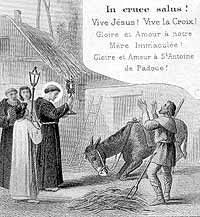 |
St. Anthony (1195-1231) was another great witness of the Holy Eucharist. One day he was arguing with a man named Guillard, an Albigensian heretic, who denied the Real Presence of Jesus in the Blessed Sacrament. Guillard said to Anthony, "If you can prove to me by a public miracle, that the body of Christ is really in the Eucharist, I promise you that I will at once give up all my beliefs and humbly believe all the doctrines that you preach!"
St. Anthony was not afraid but humbly trusted that God would prove to this heretic, that the Body of Christ was really in the Eucharist. "Well," said Guillard, "I have a mule which I shall keep without food for three days, and then I will bring it out to the public square. On your part, you will bring the Sacred Host. I will offer my mule some hay. If the mule kneels down before the Blessed Sacrament, instead of eating the hay, I will truly believe that I am wrong in my beliefs and I will believe in the Holy Eucharist."
Anthony offered the whole affair to God and prayed earnestly that proof would be given to the man. On the third day, after he said his Mass, St. Anthony, came from the church carrying the Blessed Sacrament and at the same time singing a hymn. There was a great crowd of believers and unbelievers present to witness the miracle. Anthony then spoke to the mule, "In the name of God, your Creator, Whom I am unworthy to carry in my hands, I command you to come at once with all humility, and show God the respect that you owe Him. By doing this, God will prove to heretics that they must know that all creatures are subject to God their Creator who becomes present on the altar at Mass, by the words of the priest!"
Guillard then offered
the hay to his hungry mule and suddenly received a great surprise. He
was amazed to see his mule refuse to eat the hay and kneel down before
the Blessed Sacrament. Guillard the heretic was converted on the spot
and humbly knelt down before the Most Blessed Sacrament. Afterwards,
to honour the occasion and to show that he was thankful for this grace,
he had a church built on the spot where the miracle had taken place.
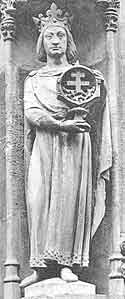 |
|
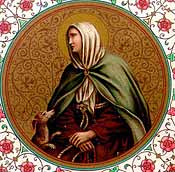 |
Another lover of the Holy Eucharist was St. Margaret of Cortona (1247-1297). She had been a great sinner in her past life, but she converted and became a Third Order Franciscan. She went to confession and received Holy Communion almost every day! As she approached the altar, she was so overcome with the thought of God’s majesty and her unworthiness that she trembled. She was afraid that on account of the wickedness of her past life, her desire to receive Holy Communion so often was displeasing to God. She would say to God, “Do I offend Thee O Lord, by my great desire to receive often in Communion, Thy Holy Body and Blood?”
Jesus replied, “This frequent Communion is so pleasing to Me that I shall bless thy confessor and guide and grant him a special grace for having encouraged you not to be afraid to receive Communion very often.
 |
Another great sinner,
Blessed Angela of Foligno,
Blessed Angela said,
“The Holy Eucharist is the Sacrament of Love that stirs up the soul
to fervent (well done), prayer. It stirs up our hearts to beg graces
from God and this forces God to grant our petition. The Holy Eucharist
makes us more humble, and above all It makes the flame of love grow in
our hearts; Because the Blessed Sacrament gives our souls so many blessings,
it is truly the Gift of Gifts, and the Grace of Graces.”
St. Yves of Brittany,
In the same century,
Mary of Oignies, who died in 1213, often saw at the Elevation of the Host,
Our Lord as a little Baby surrounded by Angels. She received Communion
often and when she did, her face would light up. At the moment the priest
received Communion, Mary saw Jesus descend into his soul and fill it with
marvelous brightness. At times the holy woman saw Our Lord in the form
of a lamb or a dove. Jesus would also show himself to her sitting on
his Mother’s lap; at Candlemas, in the arms of Simeon; and at Passiontide,
on the Cross.
St. Gertrude, (1256-1302),
a Benedictine nun from
St. Elizabeth of
All ye holy saints of the Blessed Sacrament,
Pray for Us!
Home | Contact
| Mass Centres | Schools
| Pilgrimages | Retreats
|
Precious Blood Residence
District Superior's
Ltrs | Superor General's
Ltrs | Various
Newsletter | Eucharistic
Crusade | Rosary Clarion | For
the Clergy | Coast to Coast |
Saints | Links